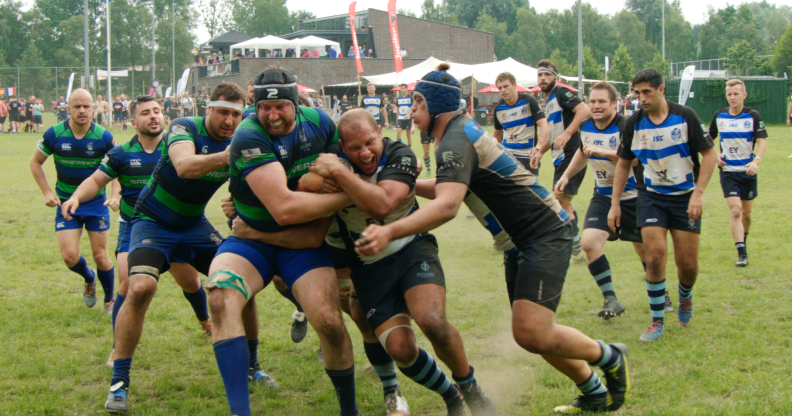New film coming to Amazon Prime shows how the world’s first gay rugby club saved lives and smashed stereotypes

The new documentary ‘Steelers’ tells the story of the King’s Cross Steelers, the world’s first gay rugby club
A searing documentary about history-making gay rugby club the King’s Cross Steelers will soon be available exclusively on Amazon Prime Video from April 16. Here’s why you should watch it.
When Israel Folau’s homophobia sent ripples through the world of rugby, he had no way of knowing his bigotry would inspire a bigger story.
Folau’s claims that “hell awaits” gay people saw him sacked by Rugby Australia in disgrace. Undeterred by the backlash, he simply doubled down on his beliefs by claiming the devil is to blame for trans kids and bushfires are “God’s judgment” for same-sex marriage.
Halfway around the world, the journalist and amateur player Eammon Ashton-Atkinson was listening to Folau’s words – and he knew LGBT+ children would be listening too.
“My first thought was, f**k you,” he said. “My second was, ‘What if there’s a gay kid that looks up to him? What if they see this? What if this gives more fodder to the bullies?'”
On the heels of this came his third thought: “I have to tell the Steelers’ story.”
Two years later Eammon’s done just that with a new documentary about the King’s Cross Steelers – the world’s first gay rugby club.
Debuting at the Glasgow Film Festival this week, Steelers follows the iconic London club as it challenges conventional perceptions around sexuality, gender and masculinity in sport, just by existing.
When the Steelers first formed in 1995 there was nothing else like them on the rugby landscape. It was the peak of the AIDS crisis and few straight teams would even agree to meet them on the pitch. Some ignored the invitation, believing it was an April Fool’s joke.
“They were trailblazers,” Eammon said. “They were going into the depths of Essex, playing against these straight clubs, many of whose players might never have met an openly gay man, let alone an openly gay sportsman.
“By being there, playing rugby, it showed people that not only can gay men be good sports players, but they’re just like you and I. It really did a world of good smashing stereotypes.”
But it did far more than that. For players who’d endured a lifetime of exclusion from team sports, the Steelers gave a much-needed sense of belonging, a safe place to be themselves free of judgement. Eammon was one of them.
“When I was growing up, sport in general was always this hyper-masculine environment,” he said. “For whatever reason, the kids at school worked out that I was gay before I even knew it. That meant I was the butt of the jokes in every sports class or rugby match.
“They played up to all the stereotypes, that gay people have limp wrists and can’t throw a ball, so I was never really given the opportunity to succeed or to practice or to belong in a sporting environment.”
The bullying grew so bad that by the time he reached his senior year he was skipping every sports class. “By the end I absolutely hated it, passionately hated it you could say. And that was a real shame,” he said.
Those scars will never go away, but Eammon found something of an antidote with the Steelers, a team that gave him a space to fail and learn and improve, and gradually fall in love with sports again.
His experience is echoed by so many of his teammates, who speak candidly about their struggles with mental health and the salvation they’ve found with the club. For some – Eammon included – the Steelers has quite literally been a lifesaver.
“I got to the point where I wrote a goodbye note. That’s how low my depression had got,” he revealed. “And that was all a result of people’s words. They do have impact.”
Nearly three decades after it began the Steelers is a thriving, joyful celebration of masculinity in all its forms. And it’s no longer alone: there are now 80 gay and inclusive rugby clubs around the world, not to mention a bona fide gay rugby league.
But Israel Folau’s comments serve as an inescapable reminder of the homophobia that remains.
This painful truth underscores the whole documentary, which nonetheless manages to be a heartwarming success story, one Eammon hopes will serve as a vital counterpoint to the bigotry.
“Sportsmen and sportswomen, they’re like the modern day gladiators: they are role models in our society,” he said. “What they say and do matters because people do look up to them.
“I think the fact that that there aren’t many openly gay players in any league of professional sport for men just shows that we still do have a long way to go. And I hope that my film is one step towards where we need to be as a society.”
The film will be available to stream on Amazon Prime Video from 16 April. To watch it sign in or sign up to Prime for £7.99 per month or £79.99 per year at amazon.co.uk.
This article contains affiliate links, PinkNews may earn revenue if you click through and purchase products through the links.



